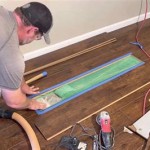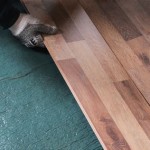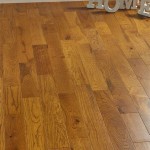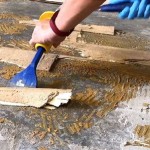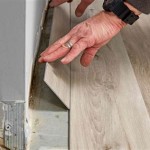Is Vinegar Safe For Luxury Vinyl Plank Flooring?
Luxury Vinyl Plank (LVP) flooring has become a popular choice for homeowners due to its durability, water resistance, and aesthetic appeal. Maintaining LVP's appearance requires regular cleaning, and many individuals seek natural and cost-effective solutions. Vinegar, a common household ingredient, is often touted as a versatile cleaner. However, the question of whether vinegar is safe for cleaning LVP flooring warrants careful consideration. This article explores the potential benefits and risks of using vinegar on LVP, providing a comprehensive assessment of its suitability as a cleaning agent.
The composition of LVP flooring plays a crucial role in determining its reaction to different cleaning agents. LVP typically consists of multiple layers, including a wear layer, a printed vinyl layer, and a backing layer. The wear layer, often made of a clear urethane coating, provides protection against scratches, stains, and general wear and tear. The printed vinyl layer gives the flooring its realistic appearance, mimicking wood, stone, or tile. The backing layer provides stability and cushioning.
Understanding the chemical properties of vinegar is essential to evaluate its impact on LVP. Vinegar is a dilute solution of acetic acid, typically containing around 5% acetic acid. Acetic acid is a weak acid, but its acidity can still affect certain materials, particularly those that are sensitive to pH changes. This acidity is the primary reason why vinegar is effective at removing dirt, grime, and some types of stains. However, it also raises concerns about its potential to damage or degrade the wear layer of LVP flooring over time.
The Potential Benefits of Using Vinegar on LVP Flooring
Despite concerns, vinegar offers certain perceived benefits as a cleaning agent for LVP flooring. One of the primary advantages is its natural and non-toxic nature. Unlike many commercial cleaning products that contain harsh chemicals, vinegar is a readily available, biodegradable substance. This makes it an appealing option for individuals concerned about the environmental impact of their cleaning practices and those who prefer to avoid exposing their families and pets to potentially harmful chemicals.
Vinegar's acidic properties can effectively dissolve mineral deposits and hard water stains that may accumulate on LVP flooring. These types of stains can be difficult to remove with neutral cleaners, and vinegar can provide a simple and effective solution. Furthermore, vinegar has mild disinfectant properties, which can help to kill some types of bacteria and germs on the floor surface. While it is not a powerful disinfectant like bleach, it can contribute to a cleaner and more hygienic environment.
Cost-effectiveness is another significant advantage of using vinegar. Compared to specialized LVP cleaning products, vinegar is significantly cheaper and more readily available. This makes it a budget-friendly option for homeowners looking to maintain their floors without incurring high expenses. The ease of use is also a factor. Vinegar can be easily diluted with water and applied using a mop or spray bottle, making the cleaning process straightforward and convenient.
The Potential Risks of Using Vinegar on LVP Flooring
The primary concern with using vinegar on LVP flooring is its potential to damage the wear layer. While the acidity of vinegar is relatively weak, repeated exposure can gradually erode the protective coating, leading to a dull or faded appearance. This is particularly true for LVP floors with a lower quality or thinner wear layer. Over time, the deterioration of the wear layer can make the flooring more susceptible to scratches, stains, and other types of damage.
Another risk associated with vinegar is its potential to seep into the seams between planks. If the seams are not properly sealed, the acidic solution can penetrate underneath the flooring, potentially damaging the adhesive or the subfloor. This can lead to warping, loosening, or other structural problems. In addition, the lingering odor of vinegar can be unpleasant for some individuals, although it typically dissipates relatively quickly. However, for those sensitive to smells, it can be a significant drawback.
Moreover, some manufacturers of LVP flooring explicitly advise against using vinegar-based cleaners. Using vinegar can potentially void the warranty on the flooring, as it is considered an improper cleaning method. Therefore, it is crucial to consult the manufacturer's recommendations and warranty information before using vinegar on LVP flooring. Adhering to the manufacturer's guidelines can help to ensure the longevity and maintain the validity of any applicable warranty.
Best Practices for Cleaning LVP Flooring
To maintain the appearance and longevity of LVP flooring, it is essential to adopt appropriate cleaning practices. Regular sweeping or vacuuming is crucial to remove dirt, dust, and debris that can scratch or dull the surface. Using a soft-bristled broom or a vacuum with a floor brush attachment is recommended to prevent damage. Avoid using vacuums with beater bars, as these can scratch the wear layer.
For wet cleaning, a pH-neutral cleaner specifically designed for LVP flooring is generally the safest option. These cleaners are formulated to effectively remove dirt and grime without damaging the protective coating. Follow the manufacturer's instructions for dilution and application. Avoid using excessive amounts of water, as this can seep into the seams and cause damage. Instead, use a damp mop, ensuring that it is not overly saturated.
If you choose to use vinegar despite the potential risks, it is crucial to dilute it properly. A mixture of one part vinegar to ten parts water is generally recommended. This dilution reduces the acidity of the solution and minimizes the risk of damage. Always test the solution on an inconspicuous area of the flooring before applying it to the entire surface. This will allow you to assess its impact on the flooring's appearance and integrity. After cleaning with the vinegar solution, rinse the floor with clean water to remove any residue.
In addition to cleaning, preventive measures can help to minimize the need for frequent or harsh cleaning. Using mats at entrances can trap dirt and debris before they are tracked onto the flooring. Applying felt pads to the feet of furniture can prevent scratches and dents. Promptly cleaning up spills and stains can prevent them from setting in and becoming more difficult to remove. These simple steps can significantly extend the life of LVP flooring and maintain its appearance.
When considering cleaning products for LVP flooring, it is important to read the labels carefully and avoid products that contain harsh chemicals, such as bleach, ammonia, or abrasive cleansers. These chemicals can damage the wear layer and cause discoloration or other types of damage. Opt for products that are specifically formulated for LVP flooring and that are pH-neutral or slightly acidic. This will help to ensure that the flooring is cleaned effectively without causing harm.
Ultimately, the decision of whether to use vinegar on LVP flooring is a personal one. While vinegar offers certain benefits as a natural and cost-effective cleaner, it also poses potential risks to the flooring's wear layer. By understanding the potential benefits and risks, adopting best practices for cleaning, and consulting the manufacturer's recommendations, individuals can make informed decisions about how to maintain their LVP flooring and ensure its longevity. Alternatives like pH-neutral cleaners specifically designed for LVP are generally the safest and most recommended options for maintaining the flooring's appearance and preserving its warranty.
Regular maintenance and careful selection of cleaning products are key to preserving the beauty and durability of LVP flooring for years to come. Prioritizing gentle, pH-neutral cleaners and adhering to the manufacturer's guidelines will contribute to a cleaner, healthier, and more sustainable living environment.

Cleaning Vinyl Plank Flooring

The Secret To Cleaning Luxury Vinyl Plank Floors Crazy Life With Littles

The Best Cleaning S For Lvp Flooring Keep Your Floors Spotless With These Effective Solutions

Everything You Need To Know About Luxury Vinyl Plank Floors

Lvp Floors How To Care For Your

How To Clean Luxury Vinyl Wood Flooring Which Cleaners Are Safe

Things You Should Not Use To Clean Luxury Vinyl Floors Upfront Home Services

The Best Way To Clean Vinyl Plank Flooring Proximity Mills

How To Clean Vinyl Floors Tarkett

How To Clean And Maintain Luxury Vinyl Plank Lvp Flooring
See Also
